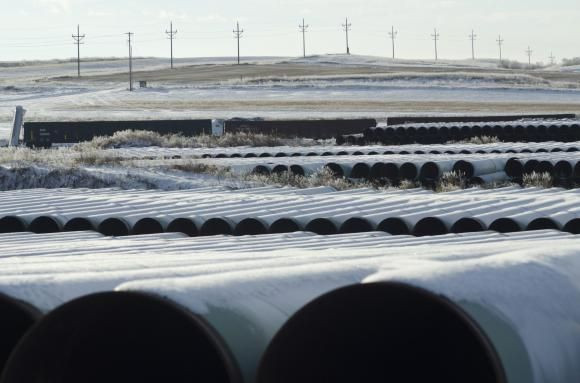Keystone XL Pipeline: Senate Approves Bill To Build Controversial Crude Oil Pipeline

Controversial legislation to approve the Keystone XL oil pipeline passed by a 62-36 vote in the GOP-controlled Senate Thursday afternoon, despite President Barack Obama’s long-standing pledge to veto the bill. The House of Representatives will vote on the bipartisan measure -- an $8 billion north-south pipeline for Canadian oil -- before it heads to the Oval Office.
"I'd like to congratulate Sen. [Mitch] McConnell for passing this bill in an open, inclusive and bipartisan way," House Speaker John Boehner, R-Ohio, said in a statement. "After dropping his scheme to tax middle-class college savings, we hope President Obama will now drop his threat to veto this common-sense bill that would strengthen our energy security and create thousands and thousands of new, good-paying American jobs.”
Jack Gerard, the president and CEO of the American Petroleum Institute, commended the Senate’s passage of the Keystone legislation and urged Obama to do the same. “Republicans and Democrats alike on Capitol Hill are speaking in one clear voice saying it’s time to build KXL,” Gerard said in a statement. “We cannot afford to veto 42,000 good-paying American jobs because of politics as usual. We urge the president to make the right decision and approve KXL because it is in this nation’s best interest.”
McConnell, R-Ky., called on fellow lawmakers ahead of the vote Thursday to approve the pipeline, which Republican leaders say will create tens of thousands of U.S. jobs, USA Today reported. “Constructing Keystone would pump billions into our economy. It would support thousands of good American jobs,” McConnell reportedly said Thursday morning.
“And as the president's own State Department has indicated, it would do this with minimal environmental impact.”
Obama has said the Keystone XL pipeline, which would pump nearly 1 million barrels of oil each day from Canada to refineries in Texas and Oklahoma, would have a minor impact on gas prices and a major impact on carbon pollution. Obama also has said the bill is too similar to last year’s version, which he would have vetoed had it passed.
"The fact is this piece of legislation is not altogether different than legislation that was introduced in the last Congress," White House press secretary Josh Earnest told reporters earlier this month, according to the Huffington Post. "I can confirm for you that if this bill passes this Congress, the president wouldn’t sign it either.”
© Copyright IBTimes 2025. All rights reserved.





















